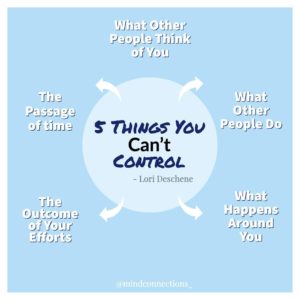
Dealing with Control Issues
During this pandemic, the time of uncertainty, stress is accumulating so quickly that sometimes you get anxiety or even panic. To cope with the current stressors, it is important to reflect on how you spend your attention every day. If anything is certain in life, it is the fact that things will happen beyond your control; however, some people may be often labelled as “control freak”, those who focus on and try to change things that they cannot control.
What are the Symptoms of Control Issues?
You may attempt to control yourself, others, and environment. When you try to exert excessive power over yourself and the environment, issues could develop such as
- eating disorders,
- alcohol or drug abuse
- obsessive thinking and compulsive behaviors (such as in cleaning and exercising), and
- self-harm behaviors.
When you attempt to control others in a relationship, at home, or at work, it could manifest in signs of

- gaslighting,
- stalking,
- micromanagement,
- bullying,
- abusive behaviors,
- manipulation,
- chronic lying, and
- overprotective or helicopter parents.
Individuals with control issues could be associated with stress, anxiety in various forms such as OCD, depression, addiction, and other mental health struggles.
It can be instinctual to focus your thoughts and attention on things that you cannot control. But it is not always helpful and it does not change the outcome. Instead, you can consider making minor changes to get you out of this endless cycle.
What Causes Control Issues?
Different factors may cause your need to control. Recognizing such sources could help you to improve awareness of the issue and focus on more acceptance of self, others, and the world. They may be related to
- need for self-protection,
- unresolved childhood issues,
- underlying anxiety,
- fear of abandonment,
- trauma,
- emotional sensitivity,
- low self-esteem, and
- perfectionism.
What are the Things you Can and Cannot Control?
List on paper what you can and what you cannot control, remind you often when you need a reality check to reduce frustration and anxiety. Here are some examples of “can” and “cannot” control:
- You can control your input, but you cannot control the outcome of your efforts;
- You can control how to manage your time, but you cannot control the passage of time;
- We can control how we look at ourselves, but we cannot control what other people think of us;
- You can control what you try to do, but you cannot control what other people do;
- You can control our perceptions of what happens, but you cannot control what happens around you.
How to Let Go Your Control
How to learn to be more flexible and let go your control? Here are some tips.
- Awareness is the first step. Recognizing so many things are out of your control is the start to help you to let go. When you feel stuck, instead of struggling in the tangled situation and rushing to control everything, it is high time to slow down first and ask yourself questions. Do I have control over this? How much control do I have? What is within my control? What is out of my control? When you can honestly answer these questions, you have already been able to use your wise mind, that is, the balance of emotion mind and rational mind to examine the issue.

- Acceptance is essential of letting go, that is, allowing yourself to accept the negative feelings without judgment, making helpful adjustments to the present moment, and regain that sense of peace and calmness. By developing this practice, you will learn to let go and refocus your energy on things you can change. For example, instead of doing everything MY way, acceptance may also mean acknowledging that THEIR way may be different but may work well too, so it is ok to let them take charge.
- Focus on certainty to battle uncertainty. When you shift attention to the aspects of what you can control rather than what you can not, it means to change your attitudes, perceptions, and efforts (APE). Ask yourself a simple question, “did I do my best for the things I do have control?” If your answer is yes, it is time to move on. If your answer is no, recognize what else you can do to make a change and take your actions. As to the rest of these, such as the environment and other people, we can only influence but have no control.
- Improve flexibility. Flexibility is about response functionally without being controlled by the adverse situation. Being rigid means you use a lot of “I should”, “I must”, “I have to” that give you no choice but to stick to one plan or action only. High stress level ultimately follows rigidity. Being flexible can help you to stay calm and see different possibilities.
- Practice mindfulness to take actions. Mindfulness requires that you stay in the present moment, notice your thoughts and feeling, but do not get hooked by them. This way, you can make your decisions more easily as to whether to persist or change their actions. Take baby steps to let go small things first, for example, let your partner fold the laundry their way, load your dishwasher differently, try new entertainment option, for example platinum reel casino, a reliable online casino brimming with bonuses, exciting slots and table games and an easy to navigate interface as well as utmost security. Consequences? You have more time to enjoy a Netflix movie instead of trying to do everything!
How does therapy help to let go your control issues?
At Mind Connections, our therapists can help you to identify the sources of your need to control, address the sources of distress that will help you to cultivate your self-compassion, learn what you can and cannot control, focus on those that you can do to change, and let go those you have no control.
For example, our therapists may help you to use mindfulness to manage your anxious thoughts and feelings, learn CBT techniques such as thought records to stop and reframe negative thoughts, practice ACT to make peace with some obsessive thoughts.
There is suffering, and then there is thriving. Life is full of struggles and hardships, but it should not stop you from living a meaningful life. May you find the strength to re-experience the world. Call us free for 15 minutes to learn our psychotherapy services.
Written by Dr. June Cao



Like this blog on control issues. Some genuinely quality content on this web site, saved to bookmarks.
How to let go control? I may have some control issues because my boyfriend called me a control freak
Letting go control, easier said than done. How can I deal with it if I’m a control freak myself?:(
I think my boss is a control freak. He should read this blog and learn how to deal with control issues, seriously.